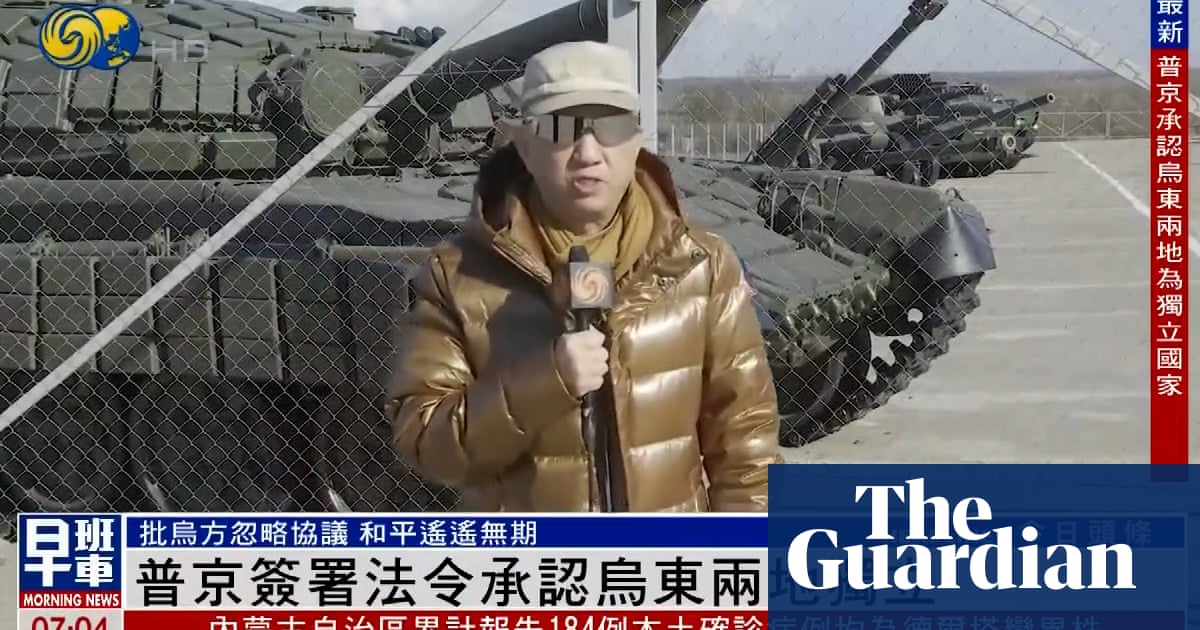In a flak jacket and helmet, the Chinese reporter Lu Yuguang stands on the side of a road as a Russian tank roars past. “I’m on the frontline in Mariupol,” he says into the microphone. He then interviews a Russian soldier who says he’s not nervous as he’s been “fighting for eight years”. In another shot, Lu talks with a group of Russian soldiers in the back of a military vehicle.
The dispatches are unusual for their extraordinary access – Lu, a veteran war reporter for a Chinese news outlet, Phoenix TV, is perhaps the only foreign correspondent embedded with Russian troops as they continue the brutal invasion of Ukraine.
He has filed reports from cities under Russian attack since the invasion began almost three weeks ago, including in Mariupol where local authorities say thousands of people have been killed.
Lu appears to have gained exclusive access to Russia’s side of the conflict. In one report on 2 March, he interviewed the leader of the self-proclaimed republic in Donetsk, Denis Pushilin. Lu said the Donetsk militia cannot compare to Ukrainian forces, “but with the help of Russian forces, eastern Ukraine militia have liberated 40 residential areas within the administrative line. The victory keeps expanding.”
The Guardian is not aware of any other foreign journalists reporting from such close quarters on the Russian side of the invasion. A long-running Russian government campaign against independent media has intensified since the war began, with foreign outlets among those forced to end operations after Vladimir Putin signed a law carrying 15-year prison terms for what the Kremlin considers “fake news”. As such, Lu’s unusual access to the Russian military stands in stark contrast to that of other reporters. It has also fuelled questions about the extent of cooperation between Moscow and Beijing.
Since the two governments signed an “unlimited partnership” shortly before Russia went to war in Ukraine, Beijing has struggled to balance its support for Moscow with the global condemnation of the invasion and swaths of international sanctions. It has outwardly sought to maintain a neutral position in the conflict but refuses to label Russia’s act as an invasion or the fighting as a war, and has amplified anti-western narratives, blaming the US and Nato for the conflict.
Beijing has also pushed Russian disinformation and conspiracy theories, including un-evidenced accusations that US-funded labs in Ukraine were secretly producing chemical weapons, and early claims by Russian state media that the Ukrainian president, Volodymyr Zelenskiy, had fled Kyiv.
Lu’s unusual access has fuelled questions about the extent of cooperation between Moscow and Beijing. Photograph: Screengrab
Lu is a well-known journalist in China, and his career and background have been reported on by Tencent, Sohu and Sina.
His reports from Ukraine have included Russian disinformation such as claims of more than 1,000 people held hostage as human shields by Ukrainian militants. However, his interviews with Ukrainian civilian victims, and criticism of Chinese internet users objectifying Ukrainian women, have also drawn nationalistic and pro-Russia trolling, accusing him of creating pro-Ukraine “rumours” and being “crooked assed”, an internet slang term for having bias or lacking objectivity.
According to profiles on Phoenix TV’s website and news articles about Lu, the correspondent is a former navy officer in the People’s Liberation Army, who lived in Moscow for several decades and covered events including the Chechen war, where he reportedly had Russian military protection. He has received multiple awards from the Russian government and military for his reporting. He has previously said that his outlet has good relations with intelligence figures in Russia.
ProfSteve Tsang, the director of the Soas China Institute, said Lu could have gained access through his personal connection to Russia, or because of China’s general support for its government.
“They are not mutually exclusive. The only thing I think we know for sure is that Russia will not allow any foreign journalist to be embedded with Russian forces unless it is certain that the embedded foreign journalist will portray Russian forces and efforts in a positive light. The fact that Lu is embedded should show that the Russian authorities know him well enough to be certain he would not write negatively about the Russian war efforts.”
Phoenix TV did not respond to questions about how Lu was able to embed with Russian troops.
